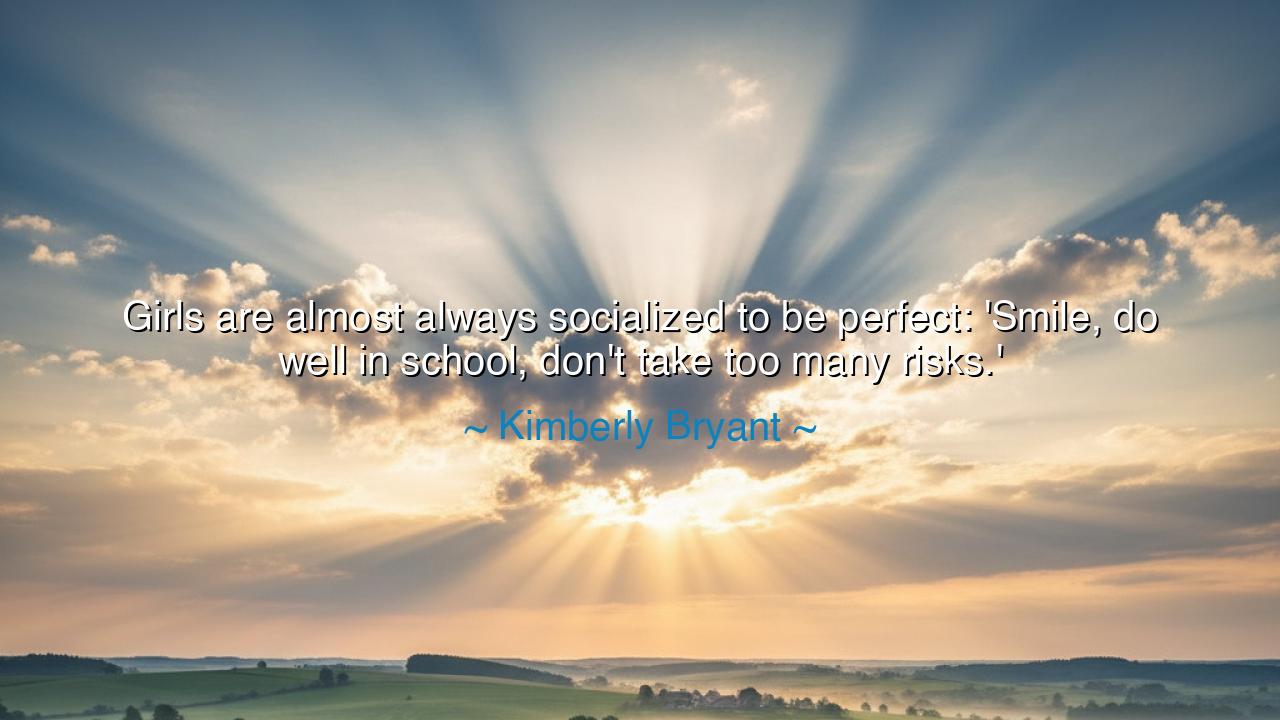
Girls are almost always socialized to be perfect: 'Smile, do well
Girls are almost always socialized to be perfect: 'Smile, do well in school, don't take too many risks.'






Hear the powerful words of Kimberly Bryant, a builder of paths where none were laid before: “Girls are almost always socialized to be perfect: ‘Smile, do well in school, don’t take too many risks.’” These words reveal not a light complaint, but a deep truth about the shaping of lives. For from their earliest days, girls are too often taught to confine themselves to narrow molds—to be pleasing, to be careful, to be flawless in the eyes of others. Yet such training, though cloaked in praise, can become a chain that binds their spirit, restraining the fire of daring and discovery that the world so desperately needs.
The origin of this truth lies in the ancient patterns of society, where women were judged by their obedience and their conformity, while men were praised for boldness and invention. Bryant, as founder of Black Girls Code, has seen firsthand how many young women—brilliant, capable, and full of potential—hesitate to seize opportunity because they were told to “play it safe.” The demand to smile becomes not an act of joy, but a command to appear agreeable; the demand to “do well in school” becomes not a call to curiosity, but a cage of perfectionism; the warning “don’t take too many risks” becomes not wisdom, but a wall that stifles courage.
History shows us the price of these chains, but also the triumph of those who broke them. Consider the life of Marie Curie, who was not expected to risk herself in the laboratories of men. Yet she defied custom, pursued her studies in secret, and in time unveiled the mysteries of radioactivity, winning two Nobel Prizes. Her greatness was not born of following society’s script, but of stepping boldly into risk where others told her not to tread. Had she obeyed the narrow rules for women of her time, the world would have been robbed of her discoveries.
And consider too the story of Rosa Parks, who lived in an age when women of her color were expected to remain silent, obedient, and invisible. She was told, in countless ways, to sit quietly, to comply, to “smile” even in the face of injustice. But when she refused to surrender her seat on that Montgomery bus, she broke through the web of expectation. Her courage sparked a movement that reshaped history. Parks showed that sometimes the most powerful act is to refuse to conform to what others expect of you.
The meaning of Bryant’s words is thus a warning and a call. To socialize girls to be perfect may seem kind, but in truth it deprives the world of their strength, their daring, their creativity. The quest for perfection does not create leaders; it creates hesitation. The fear of risk does not protect them; it prevents them from reaching the heights that boldness can bring. If society continues to tell its daughters to “be perfect” instead of “be brave,” it condemns itself to poverty of imagination and spirit.
The lesson is clear: girls, and indeed all people, must be freed to embrace imperfection, to risk failure, to walk paths no one else dares. True greatness comes not from flawless performance, but from courage. Let us teach our daughters not only to smile, but to speak; not only to do well in school, but to question, to create, to challenge; not only to avoid risk, but to embrace it when the cause is just. The world does not need perfection—it needs daring souls who are unafraid to stumble as they climb.
Practical action must follow. Parents, teachers, leaders—speak differently to your daughters. Praise them not only for neatness and obedience, but for boldness, for resilience, for trying what others fear. Encourage them to code, to build, to lead, to speak out, even if they fail at first. And to the daughters themselves: remember that you were not born to fit into narrow molds. You were born to create, to risk, to live fully. Do not seek to be perfect; seek to be alive and fearless in the pursuit of your calling.
Thus the teaching is sealed: perfection is a prison, but courage is freedom. Kimberly Bryant’s words remind us that the chains of expectation are subtle, but they can be broken. Let us raise a generation of women who do not hide behind flawless smiles, but who face the world with daring hearts. For it is not those who play safe that change history, but those who risk everything for the chance to create a better tomorrow.






AAdministratorAdministrator
Welcome, honored guests. Please leave a comment, we will respond soon